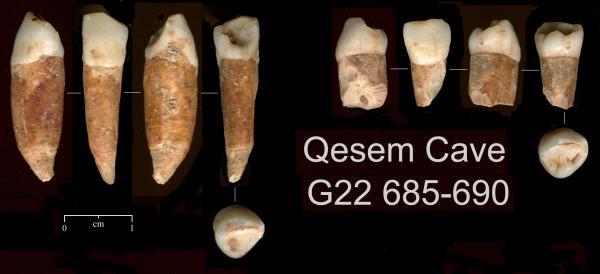Please note: Osher Rainforest will be closed for maintenance Jan. 14–16.
Science News
400,000 Year Old Human Teeth?
January 6, 2011

A group of scientists have discovered hominid teeth that are really, really old and it’s causing quite a stir…
In case you missed it, their paper, published two weeks ago in the American Journal of Physical Anthropology, reports the finding of eight human fossil teeth in the Qesem Cave, a pre-historic site in Israel. In the paper, the authors make three hypotheses suggesting to whom the teeth belong.
According to their report, the teeth could belong to a Homo sapiens-like regional species, a H. neanderthalensis-like Neanderthal relative, or they could belong to several different species.
What seems to have caused the most commotion is the first theory or a misrepresentation of the first theory. Use of the cave dates to a period 200,000-400,000 years ago, during the Middle Pleistocene. Previous research shows the first Homo sapiens lived in Africa about 200,000 years ago. They dispersed out of Africa some 70,000 years ago. Does the finding of these ancient teeth challenge the timing and location origins of Homo sapiens? Some news outlets seem to think so. “…the earliest evidence yet for the existence of modern man,” offered AP. “…calls into question the widely held view that Africa was the birthplace of modern man” said Discovery News.
Hold your horses, say Carl Zimmer, Brian Switek, Nature News and Forbes, That’s not what this study claims!
As Switek describes in his Laelaps blog on Wired:
Since the reality of human prehistory was recognized in 1859, the time and place of our origins has been one of the most contentious subjects in anthropology.
Contentious and spotlight-stealing.
Apparently, as the Forbes article outlines, the press release accompanying this study is the cause of all this sensationalism. Nature News interviews one of the authors, who simply states, “What I can say is that they [the teeth] definitely leave all options open” in terms of human origins.
Switek reminds us:
If they teach us anything, the Qesem Cave teeth remind us how much remains to be discovered about human evolution during the past 500,000 years.
The scientists wanted to preserve the teeth, so a DNA analysis has not yet been done. Perhaps this analysis holds the key to the tooth-baring species. Stay tuned.